In the world of natural sweeteners, coconut sugar, and coconut palm sugar are two frequently encountered options. Both boast health benefits and a unique flavor profile, but are they truly distinct products?
Let’s delve into the world of Coconut Sugar vs Coconut Palm Sugar to see if the difference lies only in their names.
Understanding Sugar Varieties: Coconut Sugar vs. Coconut Palm Sugar
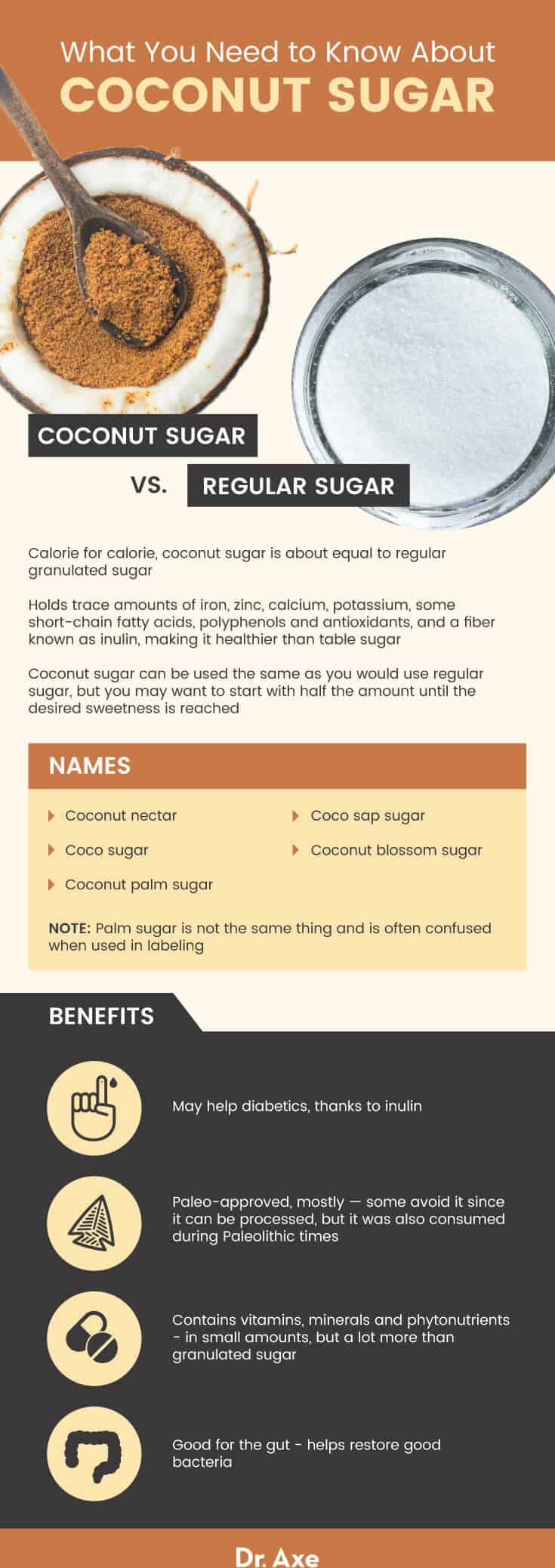
Choosing sweeteners can be confusing, especially with so many options available. This article explores the world of coconut sugar and coconut palm sugar, two popular alternatives to refined sugar. Let’s learn about their unique characteristics, health benefits, and culinary uses. By the end, you’ll be able to choose the sugar that best suits your taste and dietary needs.
Coconut Sugar and Coconut Palm Sugar: What’s the Difference?
Both coconut sugar and coconut palm sugar are natural sweeteners derived from the sap of coconut palm trees. They’ve gained popularity for their natural sweetness and unique flavors.
- Coconut Sugar is made by simply evaporating the sap, resulting in a brownish, granular sugar with a subtle caramel taste.
- Coconut Palm Sugar: Undergoes additional processing to remove impurities. It has a finer texture and a slightly toffee-like flavor.
Both sugars have a lower glycemic index than refined sugar, making them a potentially better choice for those managing blood sugar levels. They also contain small amounts of minerals.
Healthier Sweeteners: Your New Choice?
Compared to traditional table sugar, coconut sugar, and coconut palm sugar offer some potential health benefits:
- Lower Glycemic Index: This means they cause a slower rise in blood sugar levels, which can be helpful for people with diabetes or those watching their blood sugar.
- Natural Sweetness: These sugars offer a more natural and potentially nutrient-rich alternative to refined sugar.
- Unique Flavor: They can enhance the taste of your dishes without sacrificing your health goals.
Next Steps: Exploring Nutritional Content and Processing Methods
The next section will delve deeper into the nutritional content and processing methods of coconut sugar so you can make an informed decision about which option might be best for you.
Coconut Sugar: Nutritional Content And Processing
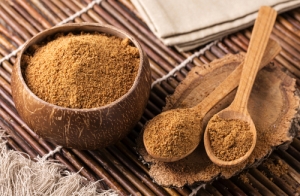
Coconut sugar is a natural alternative to refined sugar that offers some additional benefits. It contains small amounts of minerals like iron, zinc, and calcium, along with antioxidants.
Here’s how coconut sugar is made: Sap is extracted from the flowers of coconut palm trees. This liquid is then evaporated to create sugar crystals. This process helps preserve some of the coconut’s natural nutrients.
Coconut sugar can be used in place of regular table sugar in a 1:1 ratio, making it a versatile and potentially healthier option for sweetening your favorite recipes.
Glycemic Index of Coconut Sugar
As mentioned earlier, coconut sugar is produced by collecting sap from coconut flowers and evaporating it into crystals. This method helps retain some of the coconut’s nutrients.
An important factor to consider is coconut sugar’s glycemic index (GI). It has a lower GI than refined sugar, which means it causes a slower and steadier rise in blood sugar levels. So, if you’re looking for a potentially healthier sugar substitute, coconut sugar’s lower GI makes it a good option.
Coconut Palm Sugar: A Sustainable Sweetener
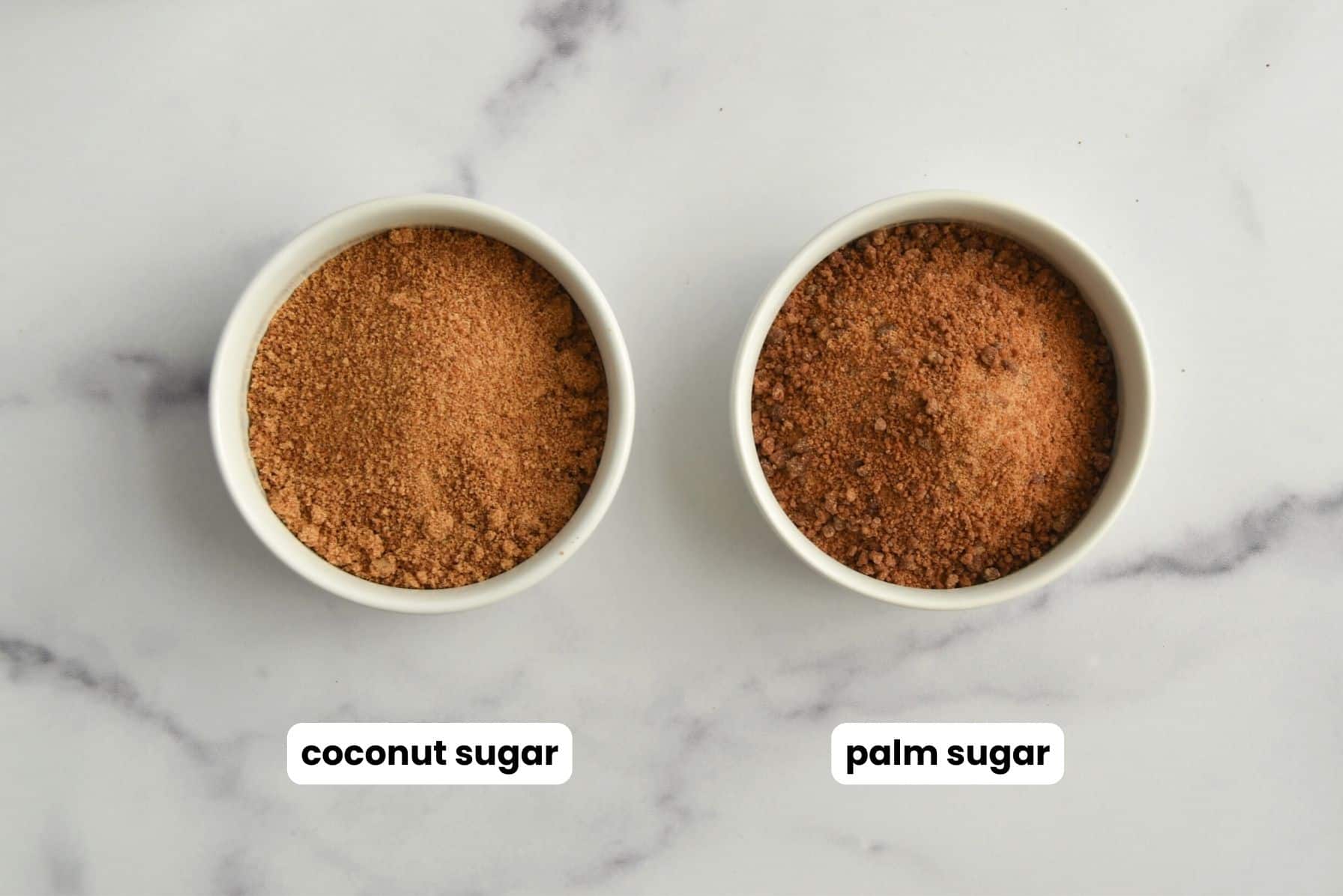
Origin and Sustainability
Coconut palm sugar, a natural sweetener derived from the sap of coconut palm trees, has a long history of use in Southeast Asian cuisine. Unlike refined sugar, it boasts a sustainable production process. Coconut palm sugar is harvested from the flower buds of the tree, allowing the same tree to continue producing sap for up to 20 years. This method minimizes environmental impact and promotes the health of coconut palm forests.
Sourcing and Environmental Impact
The sustainability of coconut palm sugar depends on the manufacturer’s practices. While the harvesting method is generally eco-friendly, choose brands that prioritize responsible sourcing and minimize their environmental footprint. Look for certifications that highlight sustainable practices.
Nutrients and Health Benefits
Coconut palm sugar offers some health advantages due to its mineral content. It contains small amounts of iron, zinc, calcium, and potassium, which contribute to various bodily functions. However, it’s important to remember that the quantity of these minerals per serving is minimal. While coconut palm sugar may provide some nutritional value, it should still be consumed moderately as part of a healthy diet.
Coconut Sugar vs. Coconut Palm Sugar: Taste, Texture, and Uses
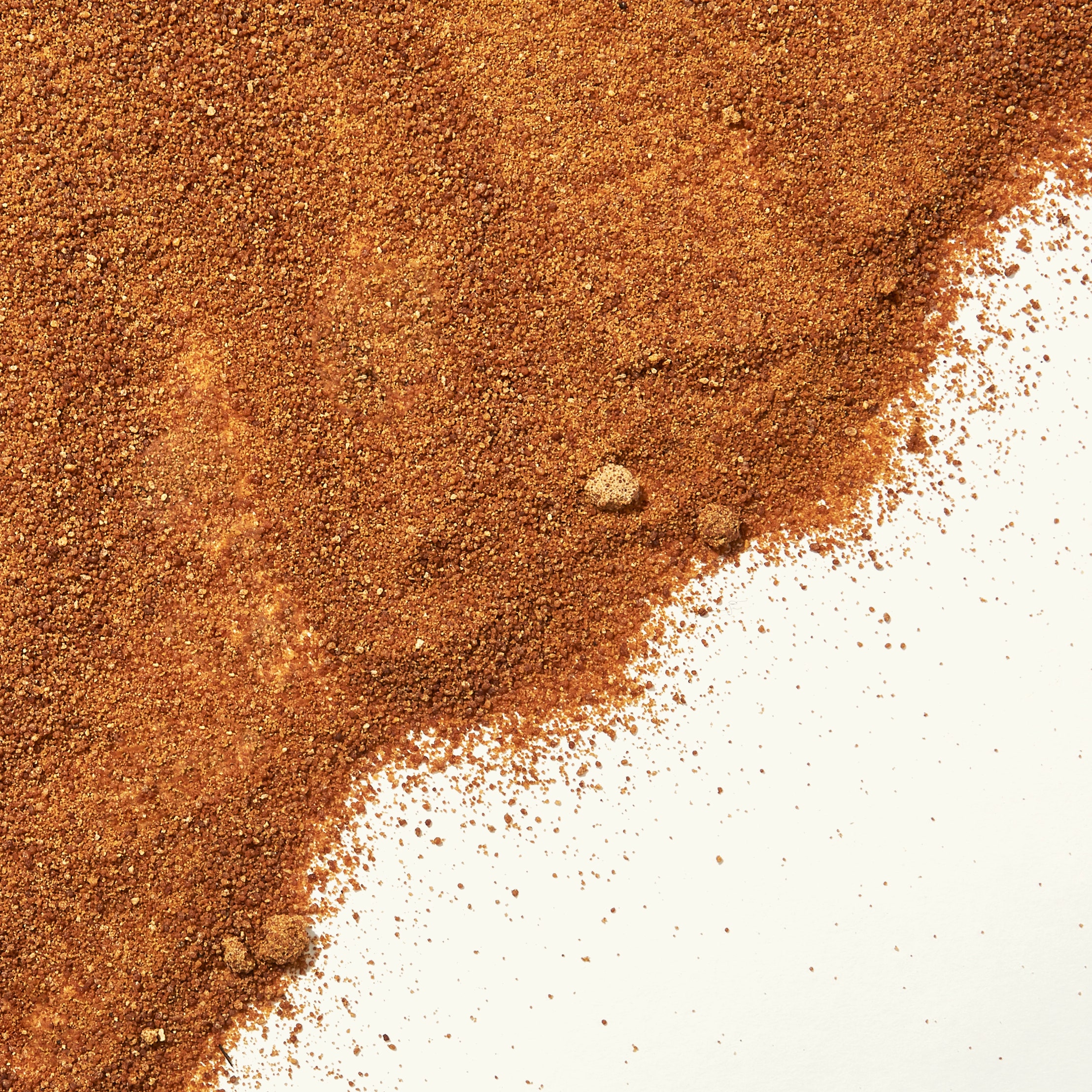
Distinct Flavors:
Coconut sugar and coconut palm sugar offer different taste experiences. Coconut sugar has a milder, subtler sweetness with hints of caramel and butterscotch, similar to brown sugar. In contrast, coconut palm sugar boasts a deeper, more complex flavor with smoky notes.
Texture Matters:
The textures of these sugars also differ. Coconut sugar has a fine, coarse texture, much like brown sugar, making it ideal for baking and sweetening beverages. Coconut palm sugar, on the other hand, has a coarser texture and is often sticky. This makes it a good choice for adding textural interest to crumbles, streusels, and toppings.
Choosing the Right Sugar:
Consider both flavor and texture when selecting your sugar. Coconut sugar is a good option if you want a subtle sweetness for baking or drinks. But if you desire a deeper flavor and textural contrast for toppings, coconut palm sugar might be the better choice.
Recipes And Cooking Tips
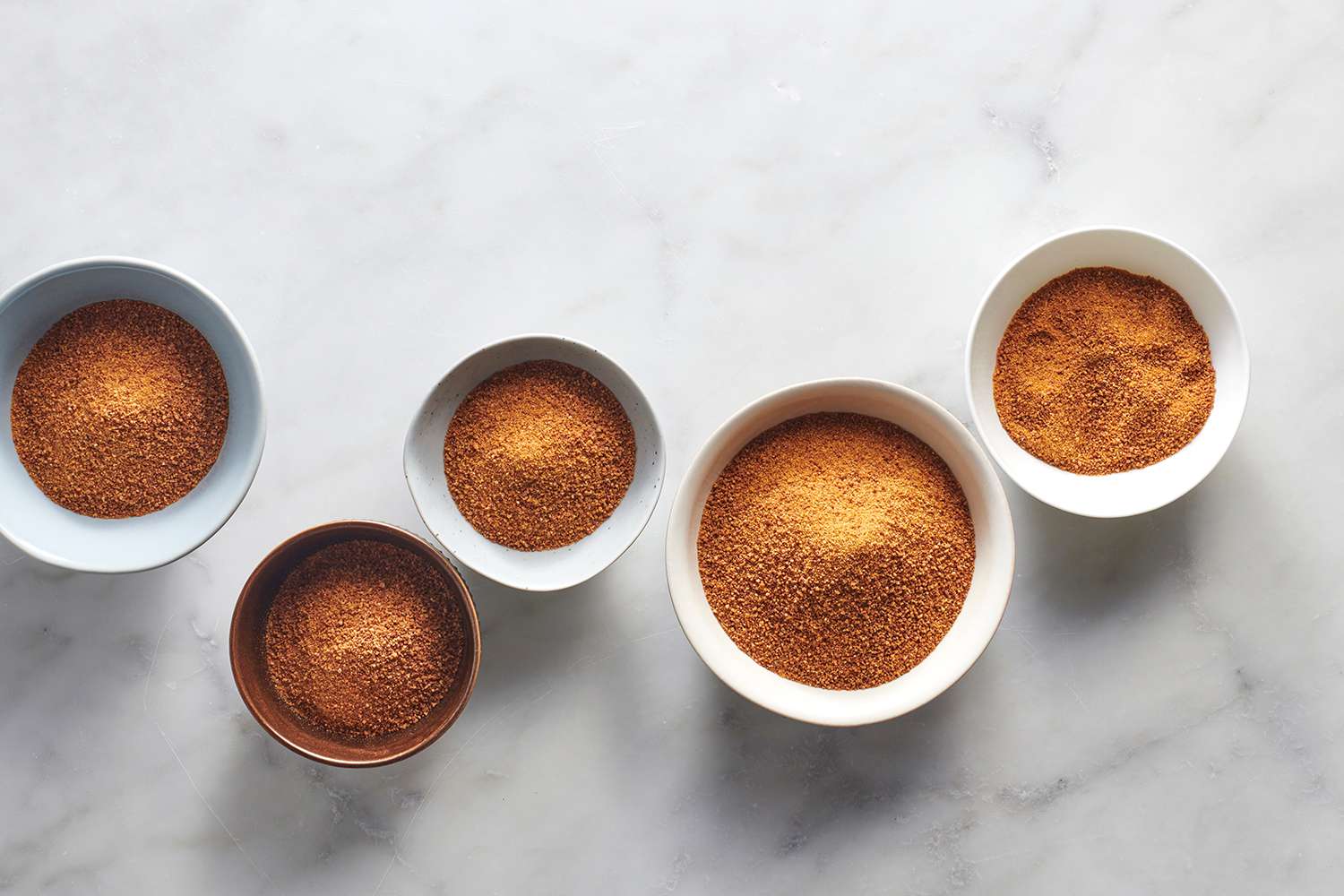
Sweeten Things Up with Coconut Sugars!
Are you looking for a natural way to add sweetness to your recipes? Coconut sugar and coconut palm sugar are perfect alternatives to traditional sugar.
Here’s how you can use them:
- Bake healthier: Replace regular sugar with coconut sugar or coconut palm sugar in your cookies, muffins, and other baked goods.
- Sweeten your drinks: Add a touch of coconut sugar or coconut palm sugar to your coffee, tea, or smoothies for a natural sweetness boost.
- Savory surprise: Experiment with these sugars in stir-fries or marinades for a subtle touch of sweetness that complements savory flavors.
- Get saucy: Heat coconut sugar or coconut palm sugar with butter or coconut oil to create a delicious caramel-like sauce.
- Glaze it up: Combine coconut sugar or coconut palm sugar with liquids like coconut milk or citrus juice for a flavorful glaze.
Tips for Using Coconut Sugars:
- Adjust liquids: Since these sugars absorb moisture, slightly reduce the amount of liquid in your recipes when using them.
- Substitute with ease: Coconut sugar and coconut palm sugar can be used in a 1:1 ratio as a replacement for granulated sugar in most recipes.
- Fine-tune texture: If you prefer a finer texture, grind the coconut sugar or coconut palm sugar in a blender or food processor before using it.
- Vegan option: These sugars are a great vegan alternative to honey in recipes.
- Flavor fiesta: Experiment with different spices like cinnamon, vanilla, or cardamom to add unique flavor profiles to your coconut sugar or coconut palm sugar creations.
Remember, you’re the chef! Adjust the sweetness and flavors to your preference. Explore the versatility of coconut sugar and coconut palm sugar, and have fun incorporating them into your cooking and baking adventures!
Conclusion: Making Informed Choices
When choosing between coconut sugar and coconut palm sugar, several factors come into play. Here’s a breakdown to help you decide:
- Flavor: Coconut sugar boasts a smoother texture and a subtle caramel taste, while coconut palm sugar offers a coarser texture with a more intense flavor.
- Texture: Consider the final product. If smoothness is desired, coconut sugar might be a better choice.
- Recipes: Since both sugars have distinct flavors, they may affect your recipe differently. Be prepared to experiment to find the perfect match.
Ultimately, the best choice comes down to your individual taste and health goals. Don’t be afraid to experiment with both sugars in various recipes to discover which works best for you. Remember, moderation is key, regardless of the sugar you choose.
References:
- https://www.healthline.com/nutrition/coconut-sugar
- https://www.thespruceeats.com/palm-sugar-coconut-sugar-overview-3217212
FAQ About Sugar Selections: Coconut Sugar Vs Coconut Palm Sugar
Q: What is the difference between coconut sugar and coconut palm sugar?
A: Coconut sugar and coconut palm sugar are often used interchangeably. However, coconut sugar typically refers to the product made from the sap of the coconut palm tree. At the same time, coconut palm sugar can also include the sugar derived from other types of palm trees.
Q: Are there any nutritional differences between coconut sugar and coconut palm sugar?
A: Both coconut sugar and coconut palm sugar offer similar nutritional profiles. They are low on the glycemic index, contain some vitamins and minerals, and are considered to be a more natural sweetener compared to refined sugar.
Q: How do coconut sugar and coconut palm sugar differ in taste?
A: Coconut sugar and coconut palm sugar have similar taste profiles with a subtle caramel flavor. However, due to variations in the production process, some may find coconut palm sugar slightly richer in taste.
Q: Can coconut sugar and coconut palm sugar be used interchangeably in recipes?
A: Yes, coconut sugar and coconut palm sugar can generally be used interchangeably in recipes as they have a similar sweetness level. However, it’s always best to adjust the quantity based on personal preference and the specific recipe.
Q: Are there any environmental or sustainability differences between coconut sugar and coconut palm sugar?
A: Both coconut sugar and coconut palm sugar are considered environmentally friendly options as they are produced from the sap of coconut palm trees, which are sustainable and require minimal resources for cultivation.
Q: Are there any potential allergen concerns with coconut sugar and coconut palm sugar?
A: Coconut sugar and coconut palm sugar are naturally free from common allergens such as gluten, dairy, and nuts. However, individuals with specific allergies should always check the product labels for any cross-contamination risks.

The Finer Diner has a rich history deeply rooted in the Mt. Oliver and Hilltop community. Our journey began with a simple yet ambitious vision – to create a welcoming space where friends and families could come together to enjoy delicious, comforting meals in a classic diner-style setting. Since our establishment, we have been dedicated to serving food, creating lasting memories, and fostering a sense of belonging within our community. Our commitment to quality, authenticity, and exceptional service has been the cornerstone of our success.